![[HorribleSubs]_PSYCHO-PASS_-_07_[480p].mkv_snapshot_05.35_[2012.11.24_11.23.35] [HorribleSubs]_PSYCHO-PASS_-_07_[480p].mkv_snapshot_05.35_[2012.11.24_11.23.35]](https://lh3.ggpht.com/--oG1w1L3r3U/ULBHCcoJ6gI/AAAAAAACLCs/1A192IasRcE/HorribleSubs_PSYCHO-PASS_-_07_480p.m%25255B55%25255D.jpg?imgmax=800) |
![[HorribleSubs]_PSYCHO-PASS_-_07_[480p].mkv_snapshot_19.40_[2012.11.24_11.40.25] [HorribleSubs]_PSYCHO-PASS_-_07_[480p].mkv_snapshot_19.40_[2012.11.24_11.40.25]](https://lh5.ggpht.com/-IDdlbn4kUO0/ULBHEyTldQI/AAAAAAACLDA/7vJqbhoxBR4/HorribleSubs_PSYCHO-PASS_-_07_480p.m%25255B46%25255D.jpg?imgmax=800) |
![[HorribleSubs]_PSYCHO-PASS_-_07_[480p].mkv_snapshot_20.39_[2012.11.24_11.41.24] [HorribleSubs]_PSYCHO-PASS_-_07_[480p].mkv_snapshot_20.39_[2012.11.24_11.41.24]](https://lh3.ggpht.com/-fClwv2H1x8Q/ULBHHWsl9UI/AAAAAAACLDQ/EoCxR8UTZPg/HorribleSubs_PSYCHO-PASS_-_07_480p.m%25255B31%25255D.jpg?imgmax=800) |
The art of the conversation – there’s no one in anime who does it quite like Urobuchi Gen.
There are very few writers in anime whose stature is such that they effectively become the centerpiece of any any series they’re involved in – and often, it’s for the wrong reasons. Ask the average fan who the writer of most series is and they’ll likely struggle to come up with a name, but with Gen it’s usually the main reason they’re watching. More than the cast, the studio, the director, the soundtrack – it’s Gen that’s the name above the title. Love or hate him, he’s a singular figure, and we’re really starting to see how Psycho-Pass is an extension or his vision more than anything else. And as is usually the case with Gen, I’m hooked. Now we’ll see if he can finish the job by connecting the story emotionally and delivering a strong ending – things he generally struggles with.
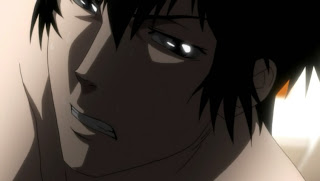 It’s hard for me to describe just how great I thought this episode was when it really all comes down to atmosphere, but without a doubt my favorite scene was the conversation between Makishima and this man (who has not been named as far as I remember). Yes, we’ve often seen this before in an Urobuchi Gen series, but the man has an ability to show people simply talking to each other and make it utterly riveting. My favorite moment in Fate/Zero was the “Summit of Kings” with Arthur, Alexander and Gilgamesh, and this was something in the same vein, though we don’t have the same attachment to the characters. It’s clear that this is Gen shamelessly using his art to think out loud, but how fascinating it is to watch – and to listen to, and full credit has to go to director Shiotano Naoyoshi here, too. I think the element that really put the scene over the top was having Beethoven’s “Ode to Joy” playing in the background as the two men sat in front of the fire calmly discussing the breakdown of society and the commitment of atrocities, with the music slowly building to a crescendo. “Unsettling” doesn’t even start to cover it.
It’s hard for me to describe just how great I thought this episode was when it really all comes down to atmosphere, but without a doubt my favorite scene was the conversation between Makishima and this man (who has not been named as far as I remember). Yes, we’ve often seen this before in an Urobuchi Gen series, but the man has an ability to show people simply talking to each other and make it utterly riveting. My favorite moment in Fate/Zero was the “Summit of Kings” with Arthur, Alexander and Gilgamesh, and this was something in the same vein, though we don’t have the same attachment to the characters. It’s clear that this is Gen shamelessly using his art to think out loud, but how fascinating it is to watch – and to listen to, and full credit has to go to director Shiotano Naoyoshi here, too. I think the element that really put the scene over the top was having Beethoven’s “Ode to Joy” playing in the background as the two men sat in front of the fire calmly discussing the breakdown of society and the commitment of atrocities, with the music slowly building to a crescendo. “Unsettling” doesn’t even start to cover it.
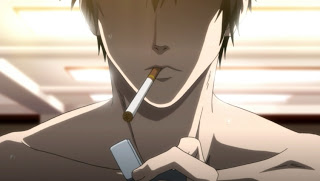 Of course this was also an incredibly important expositional scene as well, and it adds weight to the belief many of us had that Makishima isn’t simply some psychopath addicted to violence, but a political insurgent. The key line of the episode came from Choe Gu-song (Masutani Yasunori) who asks Rikako Oryo “What mischief should we get up to in order to surprise society? My head is filled with these thoughts.” The reference by Rikako to Kierkegaard’s belief that only man can feel despair, and that unless you feel despair, you cannot feel hope is obviously not coincidental to this scenario. It’s hard not to believe Gen hears the sirens song of this philosophy calling him, too, but it’s important to remember that Kierkegaard also believed that despair was not elementally part of the human condition, but instead a sickness – and that the cause of it was not denial of the self, but denial of the higher purpose of a Christian God, and one’s relation to that God.
Of course this was also an incredibly important expositional scene as well, and it adds weight to the belief many of us had that Makishima isn’t simply some psychopath addicted to violence, but a political insurgent. The key line of the episode came from Choe Gu-song (Masutani Yasunori) who asks Rikako Oryo “What mischief should we get up to in order to surprise society? My head is filled with these thoughts.” The reference by Rikako to Kierkegaard’s belief that only man can feel despair, and that unless you feel despair, you cannot feel hope is obviously not coincidental to this scenario. It’s hard not to believe Gen hears the sirens song of this philosophy calling him, too, but it’s important to remember that Kierkegaard also believed that despair was not elementally part of the human condition, but instead a sickness – and that the cause of it was not denial of the self, but denial of the higher purpose of a Christian God, and one’s relation to that God.
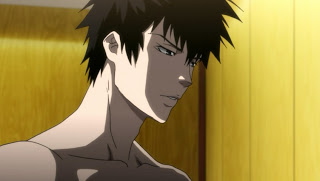 In the final analysis it seems that the issue here is “Eustress Syndrome”, and it’s philosophical ramifications. Mankind has effectively lost the will to live because technology has eliminated the need to deal with existential stress with – among other things – the introduction of the crime coefficient and Sybil system. Rikako’s father was an artist who depicted terrible suffering of young girls in his art in the belief that only in confronting the evil in our souls can we avoid being evil in practice, but Sybil took away the need for such things – and he fell onto a path of despair that eventually led to an addiction to the artificial stress reducers that sprung up after Sybil was implemented, and became a living corpse. Makishima is of the belief that some stress is essential for the human animal to exist – indeed, that response to it might even be called the will to live. And I suspect that what’s happened is that with the implementation of Sybil and the constraints to free will it implies, humans have lost the ability to thrive on stress and even to cope with it, and are on a slow decline to Eustress Syndrome as a species. That’s what Makishima seems to believe, anyway.
In the final analysis it seems that the issue here is “Eustress Syndrome”, and it’s philosophical ramifications. Mankind has effectively lost the will to live because technology has eliminated the need to deal with existential stress with – among other things – the introduction of the crime coefficient and Sybil system. Rikako’s father was an artist who depicted terrible suffering of young girls in his art in the belief that only in confronting the evil in our souls can we avoid being evil in practice, but Sybil took away the need for such things – and he fell onto a path of despair that eventually led to an addiction to the artificial stress reducers that sprung up after Sybil was implemented, and became a living corpse. Makishima is of the belief that some stress is essential for the human animal to exist – indeed, that response to it might even be called the will to live. And I suspect that what’s happened is that with the implementation of Sybil and the constraints to free will it implies, humans have lost the ability to thrive on stress and even to cope with it, and are on a slow decline to Eustress Syndrome as a species. That’s what Makishima seems to believe, anyway.
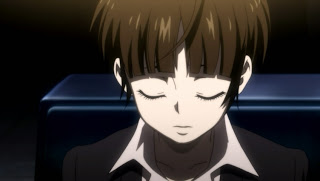 In terms of the story and characters themselves, the practical implications are profound as well. We have a psychopathic Rikako believing she’s carrying out her father’s will by using the girls in her school as living representations of his art. Exactly how Choe Gu-song fits in is unclear – he’s providing the plasticizing chemical and it clearly linked to Makishima, and certainly to the original killer of three years earlier to. What of that killer, who disappeared, but we now know worked at the same girls’ academy where Rikako’s atrocities are being played out? Kougami remains obsessed with finding the answer, despite being pulled off the case by Gino, who calls his report on the earlier murders delusional – and assigns Akane to watch the hunting dog and make sure he doesn’t get himself involved.
In terms of the story and characters themselves, the practical implications are profound as well. We have a psychopathic Rikako believing she’s carrying out her father’s will by using the girls in her school as living representations of his art. Exactly how Choe Gu-song fits in is unclear – he’s providing the plasticizing chemical and it clearly linked to Makishima, and certainly to the original killer of three years earlier to. What of that killer, who disappeared, but we now know worked at the same girls’ academy where Rikako’s atrocities are being played out? Kougami remains obsessed with finding the answer, despite being pulled off the case by Gino, who calls his report on the earlier murders delusional – and assigns Akane to watch the hunting dog and make sure he doesn’t get himself involved.
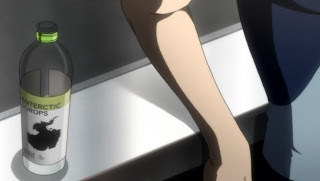 Kougami is a fascinating study in contrasts, a man who vents his extremely violent impulses in “safe” simulations, then presents a calm face to the world. Akane is very nearly obsessed with him, and it’s clear the two of them aren’t going to sit idly by and let the others work on the case – Kougami already has ideas on how to force Gino’s hand on the matter. Focusing the entire second act on the killer and her enablers was interesting – it did deprive the regular cast of much screen time, but it was spellbinding stuff. I think this is all building towards an existential crisis for Akane (though still a ways off) where she stares into the abyss and it stares back, and everything depends on how she responds. This society is clearly sick, Makishima is right about that, but surely the answer cannot lie simply in committing enough atrocities to force humanity’s internal engine to restart itself. Akane seems to be a bridge between extremes – an ethical young woman whose unique makeup has confounded Sybil, to some extent – and she will likely be the key to whatever resolution Gen crafts for his latest musing on despair and depravity.
Kougami is a fascinating study in contrasts, a man who vents his extremely violent impulses in “safe” simulations, then presents a calm face to the world. Akane is very nearly obsessed with him, and it’s clear the two of them aren’t going to sit idly by and let the others work on the case – Kougami already has ideas on how to force Gino’s hand on the matter. Focusing the entire second act on the killer and her enablers was interesting – it did deprive the regular cast of much screen time, but it was spellbinding stuff. I think this is all building towards an existential crisis for Akane (though still a ways off) where she stares into the abyss and it stares back, and everything depends on how she responds. This society is clearly sick, Makishima is right about that, but surely the answer cannot lie simply in committing enough atrocities to force humanity’s internal engine to restart itself. Akane seems to be a bridge between extremes – an ethical young woman whose unique makeup has confounded Sybil, to some extent – and she will likely be the key to whatever resolution Gen crafts for his latest musing on despair and depravity.
![[HorribleSubs]_PSYCHO-PASS_-_07_[480p].mkv_snapshot_10.22_[2012.11.24_11.29.59] [HorribleSubs]_PSYCHO-PASS_-_07_[480p].mkv_snapshot_10.22_[2012.11.24_11.29.59]](https://lh6.ggpht.com/-wT99QNGAtLg/ULBHJxq2WnI/AAAAAAACLDg/3J67B-3zcvk/HorribleSubs_PSYCHO-PASS_-_07_480p.m%25255B51%25255D.jpg?imgmax=800) |
![[HorribleSubs]_PSYCHO-PASS_-_07_[480p].mkv_snapshot_11.07_[2012.11.24_11.30.45] [HorribleSubs]_PSYCHO-PASS_-_07_[480p].mkv_snapshot_11.07_[2012.11.24_11.30.45]](https://lh4.ggpht.com/-Ksuwk1XCakA/ULBHMTW-t7I/AAAAAAACLDw/4YUVGG--X6g/HorribleSubs_PSYCHO-PASS_-_07_480p.m%25255B28%25255D.jpg?imgmax=800) |
![[HorribleSubs]_PSYCHO-PASS_-_07_[480p].mkv_snapshot_13.27_[2012.11.24_12.34.34] [HorribleSubs]_PSYCHO-PASS_-_07_[480p].mkv_snapshot_13.27_[2012.11.24_12.34.34]](https://lh4.ggpht.com/-NHovEq3yoTc/ULBHPGmvc1I/AAAAAAACLEA/E_lTinTNnYU/HorribleSubs_PSYCHO-PASS_-_07_480p.m%25255B57%25255D.jpg?imgmax=800) |
![[HorribleSubs]_PSYCHO-PASS_-_07_[480p].mkv_snapshot_13.36_[2012.11.24_12.34.43] [HorribleSubs]_PSYCHO-PASS_-_07_[480p].mkv_snapshot_13.36_[2012.11.24_12.34.43]](https://lh3.ggpht.com/-75HOx7jVFsc/ULBHSGt-zVI/AAAAAAACLEQ/RXYyVT465R0/HorribleSubs_PSYCHO-PASS_-_07_480p.m%25255B42%25255D.jpg?imgmax=800) |
![[HorribleSubs]_PSYCHO-PASS_-_07_[480p].mkv_snapshot_15.14_[2012.11.24_11.35.23] [HorribleSubs]_PSYCHO-PASS_-_07_[480p].mkv_snapshot_15.14_[2012.11.24_11.35.23]](https://lh3.ggpht.com/-UEvFxfCR0PM/ULBHUvq4FRI/AAAAAAACLEc/CzL43SuYiZs/HorribleSubs_PSYCHO-PASS_-_07_480p.m%25255B53%25255D.jpg?imgmax=800) |
![[HorribleSubs]_PSYCHO-PASS_-_07_[480p].mkv_snapshot_16.07_[2012.11.24_11.36.16] [HorribleSubs]_PSYCHO-PASS_-_07_[480p].mkv_snapshot_16.07_[2012.11.24_11.36.16]](https://lh5.ggpht.com/-wk4oCbkqL5w/ULBHWyKtbOI/AAAAAAACLEs/0pYgWzoLgCU/HorribleSubs_PSYCHO-PASS_-_07_480p.m%25255B14%25255D.jpg?imgmax=800) |
![[HorribleSubs]_PSYCHO-PASS_-_07_[480p].mkv_snapshot_17.03_[2012.11.24_11.37.12] [HorribleSubs]_PSYCHO-PASS_-_07_[480p].mkv_snapshot_17.03_[2012.11.24_11.37.12]](https://lh6.ggpht.com/-AWHvXSTTKLg/ULBHZNC5TNI/AAAAAAACLFA/xDkQq7c10wQ/HorribleSubs_PSYCHO-PASS_-_07_480p.m%25255B43%25255D.jpg?imgmax=800) |
![[HorribleSubs]_PSYCHO-PASS_-_07_[480p].mkv_snapshot_17.18_[2012.11.24_11.37.26] [HorribleSubs]_PSYCHO-PASS_-_07_[480p].mkv_snapshot_17.18_[2012.11.24_11.37.26]](https://lh6.ggpht.com/-Q__f8VWyhfg/ULBHbjLryhI/AAAAAAACLFQ/6UNafPXnlxg/HorribleSubs_PSYCHO-PASS_-_07_480p.m%25255B45%25255D.jpg?imgmax=800) |
![[HorribleSubs]_PSYCHO-PASS_-_07_[480p].mkv_snapshot_18.19_[2012.11.24_11.38.28] [HorribleSubs]_PSYCHO-PASS_-_07_[480p].mkv_snapshot_18.19_[2012.11.24_11.38.28]](https://lh5.ggpht.com/-EiCFFFSb958/ULBHfd33P9I/AAAAAAACLFk/Bqzpi1lm-T0/HorribleSubs_PSYCHO-PASS_-_07_480p.m%25255B5%25255D.jpg?imgmax=800) |
![[HorribleSubs]_PSYCHO-PASS_-_07_[480p].mkv_snapshot_19.08_[2012.11.24_11.39.43] [HorribleSubs]_PSYCHO-PASS_-_07_[480p].mkv_snapshot_19.08_[2012.11.24_11.39.43]](https://lh5.ggpht.com/-R5hq14uh6f0/ULBHiMJ85HI/AAAAAAACLF0/2r7izxneJvE/HorribleSubs_PSYCHO-PASS_-_07_480p.m%25255B21%25255D.jpg?imgmax=800) |
![[HorribleSubs]_PSYCHO-PASS_-_07_[480p].mkv_snapshot_19.16_[2012.11.24_11.40.00] [HorribleSubs]_PSYCHO-PASS_-_07_[480p].mkv_snapshot_19.16_[2012.11.24_11.40.00]](https://lh4.ggpht.com/-0hPxDoAAryo/ULBHmPKv3HI/AAAAAAACLGE/kBs-yiNJ2V4/HorribleSubs_PSYCHO-PASS_-_07_480p.m%25255B65%25255D.jpg?imgmax=800) |
![[HorribleSubs]_PSYCHO-PASS_-_07_[480p].mkv_snapshot_19.45_[2012.11.24_11.40.29] [HorribleSubs]_PSYCHO-PASS_-_07_[480p].mkv_snapshot_19.45_[2012.11.24_11.40.29]](https://lh5.ggpht.com/-Ep1J3G1MZYc/ULBHop-aDaI/AAAAAAACLGQ/-EOeMoHjzcs/HorribleSubs_PSYCHO-PASS_-_07_480p.m%25255B22%25255D.jpg?imgmax=800) |
![[HorribleSubs]_PSYCHO-PASS_-_07_[480p].mkv_snapshot_20.00_[2012.11.24_11.40.44] [HorribleSubs]_PSYCHO-PASS_-_07_[480p].mkv_snapshot_20.00_[2012.11.24_11.40.44]](https://lh6.ggpht.com/-ncMnDNBBi2U/ULBHsu3TCrI/AAAAAAACLGk/I_388aki5Hk/HorribleSubs_PSYCHO-PASS_-_07_480p.m%25255B10%25255D.jpg?imgmax=800) |
![[HorribleSubs]_PSYCHO-PASS_-_07_[480p].mkv_snapshot_20.07_[2012.11.24_11.40.52] [HorribleSubs]_PSYCHO-PASS_-_07_[480p].mkv_snapshot_20.07_[2012.11.24_11.40.52]](https://lh3.ggpht.com/-MkiemJINiiI/ULBHvl_AT_I/AAAAAAACLG0/HfA18OUUxrU/HorribleSubs_PSYCHO-PASS_-_07_480p.m%25255B56%25255D.jpg?imgmax=800) |
![[HorribleSubs]_PSYCHO-PASS_-_07_[480p].mkv_snapshot_20.12_[2012.11.24_11.40.57] [HorribleSubs]_PSYCHO-PASS_-_07_[480p].mkv_snapshot_20.12_[2012.11.24_11.40.57]](https://lh5.ggpht.com/-BiFHSU9NSlg/ULBHyfBj4XI/AAAAAAACLHE/u8dlm41pY1Y/HorribleSubs_PSYCHO-PASS_-_07_480p.m%25255B16%25255D.jpg?imgmax=800) |
![[HorribleSubs]_PSYCHO-PASS_-_07_[480p].mkv_snapshot_20.29_[2012.11.24_11.41.14] [HorribleSubs]_PSYCHO-PASS_-_07_[480p].mkv_snapshot_20.29_[2012.11.24_11.41.14]](https://lh5.ggpht.com/-BJrNl86ORCU/ULBH0jESnBI/AAAAAAACLHU/DnYySUOd7eA/HorribleSubs_PSYCHO-PASS_-_07_480p.m.jpg?imgmax=800) |
![[HorribleSubs]_PSYCHO-PASS_-_07_[480p].mkv_snapshot_21.06_[2012.11.24_11.41.51] [HorribleSubs]_PSYCHO-PASS_-_07_[480p].mkv_snapshot_21.06_[2012.11.24_11.41.51]](https://lh3.ggpht.com/-9U_EblApjw8/ULBH3P_mgwI/AAAAAAACLHk/T1wGyHpDZWk/HorribleSubs_PSYCHO-PASS_-_07_480p.m%25255B35%25255D.jpg?imgmax=800) |
![[HorribleSubs]_PSYCHO-PASS_-_07_[480p].mkv_snapshot_21.09_[2012.11.24_11.42.04] [HorribleSubs]_PSYCHO-PASS_-_07_[480p].mkv_snapshot_21.09_[2012.11.24_11.42.04]](https://lh6.ggpht.com/-YPl58kmF19U/ULBH5sPLK4I/AAAAAAACLH0/Tcgf88XnZoc/HorribleSubs_PSYCHO-PASS_-_07_480p.m%25255B49%25255D.jpg?imgmax=800) |
![[HorribleSubs]_PSYCHO-PASS_-_07_[480p].mkv_snapshot_21.10_[2012.11.24_11.41.55] [HorribleSubs]_PSYCHO-PASS_-_07_[480p].mkv_snapshot_21.10_[2012.11.24_11.41.55]](https://lh3.ggpht.com/-8Pmms6t9cBs/ULBH8HVqyQI/AAAAAAACLIE/UJU3EVaiSEA/HorribleSubs_PSYCHO-PASS_-_07_480p.m%25255B41%25255D.jpg?imgmax=800) |
![[HorribleSubs]_PSYCHO-PASS_-_07_[480p].mkv_snapshot_21.12_[2012.11.24_11.42.07] [HorribleSubs]_PSYCHO-PASS_-_07_[480p].mkv_snapshot_21.12_[2012.11.24_11.42.07]](https://lh3.ggpht.com/-75DAV_Aa8k8/ULBH_FNK2vI/AAAAAAACLIU/dSAofMOo4TE/HorribleSubs_PSYCHO-PASS_-_07_480p.m%25255B3%25255D.jpg?imgmax=800) |
![[HorribleSubs]_PSYCHO-PASS_-_07_[480p].mkv_snapshot_21.36_[2012.11.24_11.42.31] [HorribleSubs]_PSYCHO-PASS_-_07_[480p].mkv_snapshot_21.36_[2012.11.24_11.42.31]](https://lh3.ggpht.com/-zz9stp4EclU/ULBIBQ-dN3I/AAAAAAACLIk/HVWA21wMp94/HorribleSubs_PSYCHO-PASS_-_07_480p.m%25255B64%25255D.jpg?imgmax=800) |


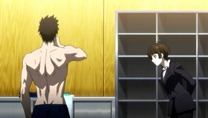
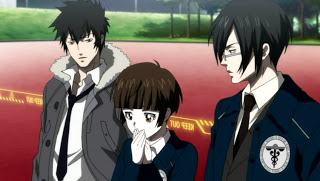


Eternia
November 24, 2012 at 6:07 amYeah. This is certainly Urobutcher.
You either love it or hate it.
I don't mind the exposition in this episode myself.
Makishima certainly has a grand scheme on his hand, to break the current world system. He is not the same with a certain glasses guy who got obsessed with internet idols, or a crazy onee-san who killed her underclassmen.
Or should I say, stupid onee-san?
The choice in her killing is too poor.
Instead of killing some random, unrelated people,
she simply kills any girlie who comes at her for guidance / question.
At this rate, you don't need a Sherlock Holmes to identify her as the criminal.
Anonymous
November 25, 2012 at 7:51 amYou have a point. It won't take long to find the murderer. But her goal is to express her father's fantasies in sculptures. Maybe some kind of final is planned, where she takes a great part in the final art. Therefore she planned a scenario in which the police is needed…
yumeruhime
November 24, 2012 at 6:17 ami do pity the friend though, you can say she is just innocently, and stupid enough, to get involved.
i myself don't mind the uro gore, but don't all the 'art pieces' look almost the same? i was expecting a little more variety… =.=
yumeruhime
November 24, 2012 at 6:18 amakane-chan staring at kougami, is so like a rom series, without the blush. we all know kougami has a nice body, but no need to stare yea XP
SlushiZ
November 24, 2012 at 6:32 amBe rude NOT to stare at those fabulous abs hahaha. It's nice to see psycho-pass throwing in a little humor between all the gruesome deaths and classy/crazy villains.
Carrie.Lyn
November 24, 2012 at 6:38 amHey Enzo how do you know Kougami was drinking an anorectic solution? I thought the bottle label was a misspelled 'Antarctic drops' as well as the outline of Antarctica. Maybe a joke about how in the future we're drinking right from the polar caps because the water everywhere else is gone/undrinkable.
admin
November 24, 2012 at 10:17 amYea, you're probably right – I didn't catch the map of Antarctica on the bottle (that's a pretty good gag, actually). It was only one letter off of "anorectic" so I thought maybe Gen was trying to tell us something about Kougami.
Stöt
November 24, 2012 at 11:08 amWell, I for one thought this episode lacked excitement and action. Maybe I should have paid more attention to the armchair discussion. Anime rarely get that kind of discussion right, they're usually more of a "look how evil I am, for no reason than being evil" monologue (even if there's two characters present).
elianthos
November 24, 2012 at 2:51 pmDear Akane, you were not alone in staring: Ko's noteworthy physique seems to magically shrink to a slimmer frame when he's fully clothed. This switch is food for thought and for some careful monitoring of the specimen.
—
On a more serious note, it's interesting how Kierkgaard was the one brought up this week.
'he reference by Rikako to Kierkegaard's belief that only man can feel despair, and that unless you feel despair, you cannot feel hope is obviously not coincidental to this scenario. It’s hard not to believe Gen hears the sirens song of this philosophy calling him, too, but it’s important to remember that Kierkegaard also believed that despair was not elementally part of the human condition, but instead a sickness – and that the cause of it was not denial of the self, but denial of the higher purpose of a Christian God, and one’s relation to that God.'
Søren imho is still well rooted in medieval thinking (and I'm not using the m.e. label in a derogatory way mind you) in this. His despair ties into the melancholia-acedia-lovesickness of Christian theological tradition, itself a bridge between Antiquity demonology, humoral theory and contemporary anomie. So far it's a pretty consinstent train of thought Urobuchi is following.
Eustress itself and Rikako's beliefs and actions can be seen as a form of anomie and melancholy in this fictional universe :), father and daughter here are opposite ends/symptoms of the same spectrum/disease.
Gen's pick of two artistically inclined figures + murder nexus (hello Saturnine temperament! On the thinker end of this sub-spectrum Makishima seems to fit the bill so far btw) to display all that still seems to me to tap into the multi-millenary theories mentioned above even more than last week.
Sorry for rambling, but I really dig these kinds of topics.
Blueicegal ♥
November 25, 2012 at 5:46 amThe episode was a bit meh for me. ( I should probably drop it at this point but just can't quite bring myself to do it). I can't even lie though… one thing made up for it: absabsabsabs 😛
Going to review Zetsuen no Tempest, Enzo?
Anonymous
November 25, 2012 at 10:06 amThis is probably going to be the best work from Gen. I loved madoka magika in its engaging narrative, way more than fatezero which presents huge cast of characters though most of character were boring as shit in similar way to watch consuming a lot of timescreen. Psycho pass is so far better in all levels.
Anonymous
November 26, 2012 at 6:48 amThis is adult anime the way it should be (without pointless fan service)i really like how dark this show is becoming. If psycho pass keeps up this momentum it just might usurp Shin sekai Yori as the best show of the fall season (which would be an insanely difficult task to do seeing as shin sekai is about to go into high gear with its plot)